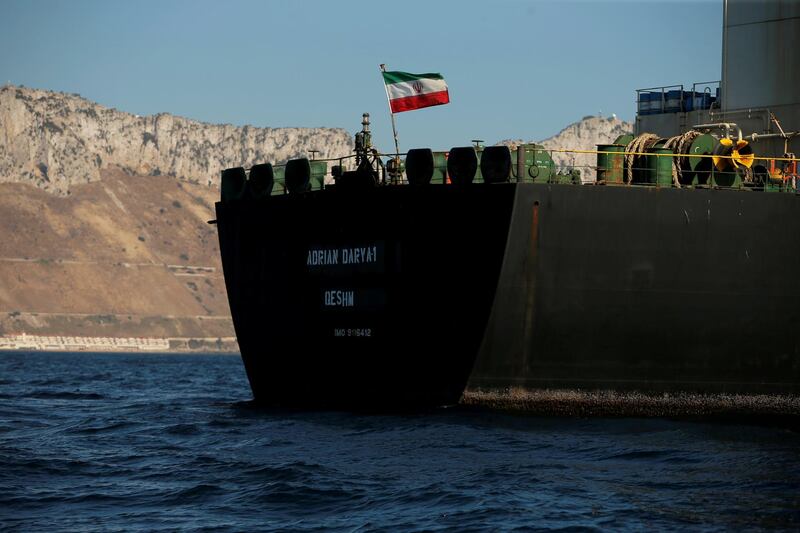After six weeks of wrangling, Gibraltar has released the oil tanker Grace 1, ostensibly to travel to Greece. British and Gibraltarian officials suspected the Iranian ship was en route to deliver a vast quantity of crude oil to Syria - 2.1 million barrels worth $123 million (Dh548m) - despite European sanctions on the war-torn nation. Grace 1, which was renamed Adrian Darya 1, once again set sail after being reflagged – at once embodying Britain and America's failed attempt to hold Tehran to account for its nefarious behaviour, and the European Union's reluctance to tackle the regime while still trying to salvage the 2015 nuclear deal.
US authorities were anxious to hold the tanker and its cargo amid suspicions it was in breach of bank fraud and money-laundering and terrorism forfeiture statutes. They also think that the ship belongs to Iran’s Islamic Revolutionary Guard Corps, considered a terrorist organisation by Washington, which launched a last-ditch attempt on Friday to block the release of the ship, to no avail. Despite all these red flags, and instead of joining forces with the US to counter Iran’s illicit trade and illegal crossing of the Mediterranean, Gibraltar rejected the US warrant and released the tanker on the grounds that it did not breach any European laws. The question mark hanging over the vessel and its real purpose will never now be truly addressed. Although Gibraltar said it was given assurances the vessel would not go to Syria, Iranian authorities deny making that promise. Meanwhile, although the ship’s official destination is Greece, there is little to prevent it from changing course. EU countries have squandered an opportunity to hold Iran accountable for its actions and squeeze an illegal supply channel to the Tehran-backed Syrian regime.
The deeply troubling stand-off has also shed light on deep flaws in European maritime security and highlighted how Tehran is exploiting the rift and divergent interests of Europe and America to its advantage. The US has imposed a series of sanctions on Tehran and its proxies in the region, going as far as to blacklist elected Lebanese parliamentarians affiliated with Hezbollah. Meanwhile, the EU is bent on preserving the flawed nuclear deal - which US President Donald Trump withdrew from in 2018 – even, apparently, to the detriment of maritime safety in the Mediterranean. For instance, while the US considers the IRGC to be a terrorist organisation, the EU does not and has so far resisted calls to start reimposing sanctions on Iran that were lifted in 2016. This was one of the reasons cited by Gibraltar for rejecting the US warrant for the renamed Grace 1. However, leniency is clearly not working. Even though Gibraltar freed the Iranian tanker, Tehran still holds the British-flagged Stena Impero and its crew captive and has made no promises regarding their release. Regime leaders in Tehran are making a mockery of efforts to curb their criminal behaviour. They seek to sow the seeds of disruption and chaos, which are yielding results while the EU and the US are at loggerheads. Global powers need to work together and agree a cohesive strategy to prevent Tehran from destabilising the entire region, and beyond.





